If your phone feels like an emotional parasite, this article’s for you. Digital minimalism isn’t about going offline forever it’s about reclaiming your brain, one scroll at a time and phone addiction recovery
Introduction
Ever feel like your phone’s got you in a chokehold? Like, you’re just trying to live your life but somehow you’re checking it 173 times a day? Yeah, that was me. I got my screen time report one week, and it said I was unlocking my phone that much. I laughed at first, then kinda flinched. I didnt even remember picking it up half the time. It was like my thumb had a mind of its own, scrolling through Instagram or Twitter like it was my job. 😅
But here’s what really got me: it wasn’t just about wasting time. It was deeper. I was avoiding stuff stress, loneliness, that nagging feeling I wasn’t doing enough. My phone was like a quick hit of dopamine, but it left me feeling empty. Anxious. Kinda lost. That’s when I stumbled on digital minimalism, and let me tell ya, it’s been a total reset for my brain.
This article’s for anyone who feels like their phone’s running their life. We’re gonna dig into what digital minimalism is, why less screen time might just save your sanity, and how you can start today without feeling like you’re missing out. No fluff, just real talk from someone who’s been there, plus some science to back it up. Ready to unplug a little? Let’s do this
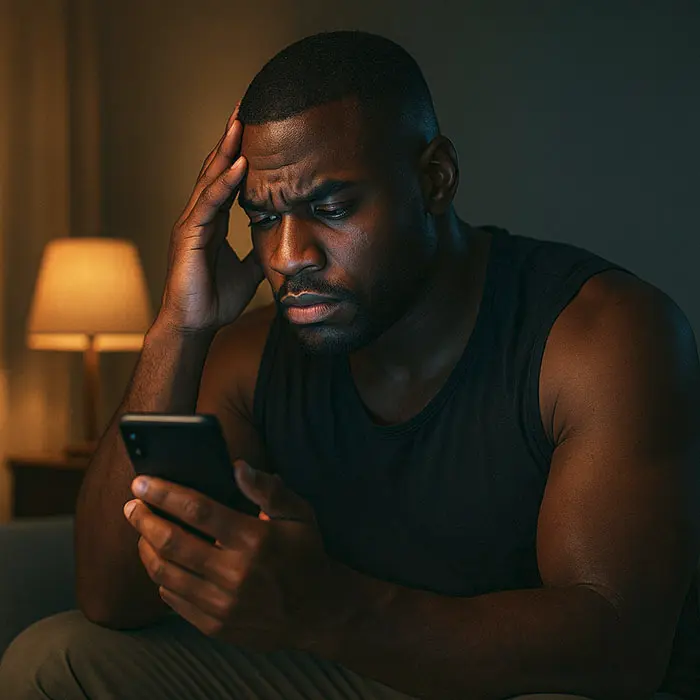
What’s Digital Minimalism Anyway?
Digital minimalism isn’t about yeeting your phone into the nearest river or going full-on hermit mode. It’s about using tech intentionally picking what actually adds value to your life and ditching the rest. Cal Newport, who wrote Digital Minimalism: Choosing a Focused Life in a Noisy World, puts it like this: it’s “a philosophy of technology use in which you focus your online time on a small number of carefully selected and optimized activities that strongly support things you value, and then happily miss out on everything else.”
In plain English? It’s about cutting the digital noise. You don’t need to check every notification or follow 500 accounts on Instagram. It’s about saying, “Hey, this app helps me stay connected with my besties, but that one? It’s just sucking my soul.” It’s not a digital detox where you go cold turkeyit’s a sustainable way to use tech without letting it use you.
Think of it like cleaning out your closet. You keep the stuff you love and wear, and you toss the itchy sweater you haven’t touched in years. Digital minimalism does that for your phone, your laptop, your brain. It’s about making space for what matters whether that’s your mental health, your relationships, or just a quiet moment to think.
My Screen Time Was a Clue (That I Wasn’t Okay)
One week, I opened my phone 173 times a day. I know because my screen report said so. I laughed. Then I flinched.
I didn’t even *remember* unlocking it most of the time. It was automatic like blinking or breathing. is it reduce screen use mean?
But here’s the part that scared me: it wasn’t just about distraction. It was avoidance. Anxiety. Loneliness. Dopamine on tap.
And I wasn’t even enjoying it.
How Screens Mess with Your Head
Let’s be real: screens are everywhere. Your phone, your laptop, your TV, even your smartwatchthey’re all fighting for your attention. And they’re winning. The average person spends about 7 hours a day on screens, according to some stats I found. That’s almost half your waking hours! And it’s not just about time it’s about what it’s doing to your head.
Too much screen time can mess with you in a bunch of ways:
- Stress and Anxiety: Constant notifications keep your brain in fight-or-flight mode. It’s like being on high alert all day.
- Sleep Problems: Blue light from screens tricks your brain into thinking it’s daytime, screwing up your sleep. I used to scroll till midnight, then wonder why I couldn’t fall asleep.
- Focus Issues: Ever try to work while your phone’s buzzing? It’s like trying to read in a room full of screaming toddlers.
- Loneliness: Social media can make you feel connected, but it’s often shallow. You’re “liking” posts, but are you really connecting?
- Mental Fatigue: Your brain’s not built for endless info. It gets tired, foggy, and just… done.
I remember one night, I was trying to finish a paper for school, but I kept checking my phone every five minutes. A text here, a TikTok there, and suddenly it’s 2 a.m., and I’m stressed out of my mind. My brain felt like it was wading through molasses. That’s when I knew I had to rethink my relationship with screens
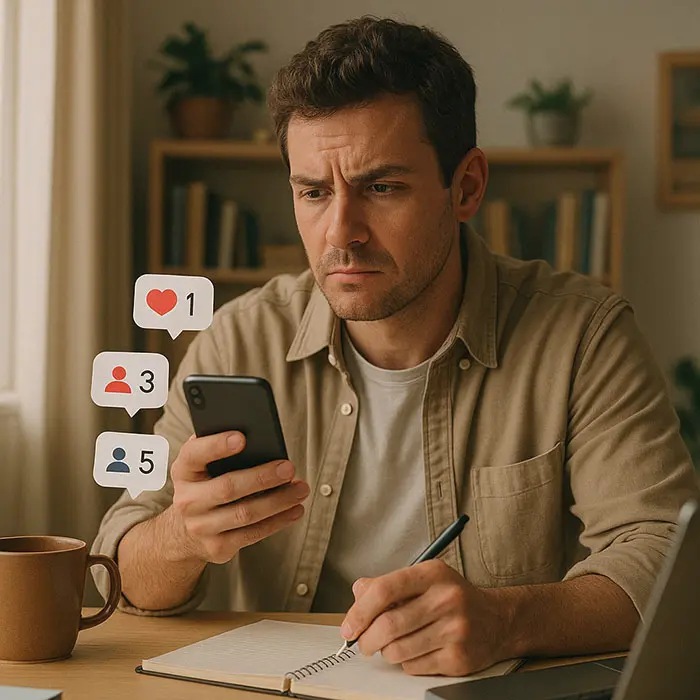
What Even Is Digital Minimalism (And Why Is It Self-Care?)
It’s not about tossing your phone into a lake (tempting tho). It’s about making tech work *for* you not the other way around.
Digital minimalism means:
– Using fewer apps, more intentionally.
– Creating “off” times (and sticking to them).
– Letting silence exist without grabbing a screen.
It’s not radical. It’s relief.
I Did a Phone “Detox” Kinda
I deleted Instagram for a weekend. Just 3 days. I didn’t tell anyone. No dramatic exit post.
At first, I reached for my phone like a ghost limb. It buzzed in my brain even when it wasn’t there.
But by Sunday, I could breathe differently. Think in full sentences. Feel bored and not panic about it.
I wrote in my notebook again. I took an accidental nap. I felt… like me.
This reminded me of what I shared in the mindful living article most of us don’t hate stillness. We’re just out of practice.
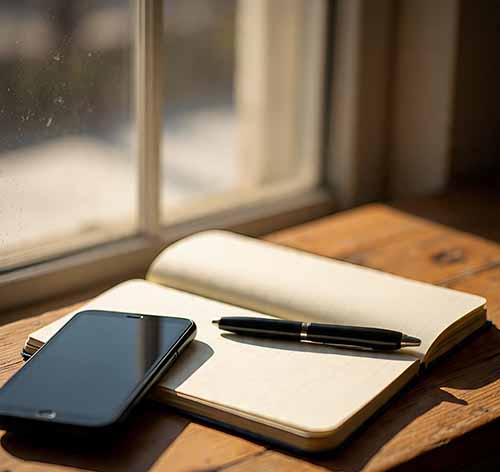
How I Use Tech Now (Without Letting It Use Me)
– No phone in bed. (Mostly. I slip up sometimes.)
– App timers and actually respecting them.
– I don’t reply to messages instantly unless I *want* to.
– I keep one social media app on my phone at a time. Max.
– I turn off all notifications except calls and bank alerts.
It’s not perfect. But I feel less… hijacked.
Why Digital Minimalism Is a Game-Changer
So, what happens when you cut back on screens and get intentional with tech? A whole lotta good stuff, that’s what. Here’s why digital minimalism might just save your sanity:
- Better Focus: When you’re not jumping between apps, you can actually get stuff done. A study from the University of British Columbia found that cutting smartphone use improved focus and productivity. I’ve noticed I can read a book for an hour now without checking my phone huge win.
- Less Stress: Fewer notifications mean less stress. Research shows reducing screen time can cut stress levels by up to 40%. I used to get anxious just seeing my phone light up now, I’m way calmer.
- Better Sleep: Less screen time, especially before bed, helps your brain wind down. I started leaving my phone out of my bedroom, and I’m sleeping like a baby.
- Deeper Connections: When you’re not glued to your phone, you’re more present with people. I had a coffee date with a friend last week, and without my phone, we had the best talk in ages.
- More Creativity: With less digital noise, your brain has room to wander. I’ve started journaling again, and it’s like I’m rediscovering my creative side.
These aren’t just my experiences science backs it up. A study in Cyberpsychology, Behavior, and Social Networking found that people who cut back on social media felt less lonely and depressed after just three weeks. Another from the University of Pennsylvania showed that limiting social media to 30 minutes a day made a big difference in mental health. Less screen time, more sanity. Simple as that. 😊
You Deserve Your Own Attention Back
Tech isn’t evil. But it’s loud. And addictive. And kind of needy.
Digital minimalism isn’t punishment it’s permissiion. To return. To recalibrate. To remember that your attention is yours.
“Screen overuse disrupts circadian rhythms and increases anxiety,”
Harvard Health Publishing
How to Start Practicing Digital Minimalism
Okay, you’re sold on the idea, but how do you actually do digital minimalism? It’s not as hard as it sounds. Here are some practical tips to get you started, based on what’s worked for me and what experts like Cal Newport recommend:
1. Set Clear Boundaries
Decide when and how you’ll use your phone. For me, I only check work emails from 9 to 5, and I turn off notifications after that. It’s like giving my brain a break from the constant ping-ping-ping. Try setting specific times for social media too like 15 minutes in the morning and evening.
2. Curate Your Digital Space
Go through your apps and social media follows. Unfollow accounts that stress you out or make you feel bad about yourself. Keep the ones that inspire or educate you. I did a big Instagram purge, and now my feed’s full of art, nature, and positivity. It’s like a breath of fresh air.
3. Practice Mindfulness
Take a moment before you pick up your phone. Ask yourself, “Why am I doing this?” If it’s just boredom, put it down. I started doing a quick breathing exercise i nhale for 4, hold for 4, exhale for 4 before checking my phone. It’s weirdly grounding.
4. Limit App Usage
Use tools like Screen Time (on iOS) or Digital Wellbeing (on Android) to set limits on apps. I cap my Instagram at 30 minutes a day, and when I hit it, I get a nudge to stop. It’s like having a digital babysitter.
5. Create Tech-Free Zones
Make some areas of your life screen-free, like your bedroom or dining table. My bedroom’s a no-phone zone now, and it’s made such a difference in my sleep. I also try to keep my phone out of sight during meals it’s amazing how much better conversations are
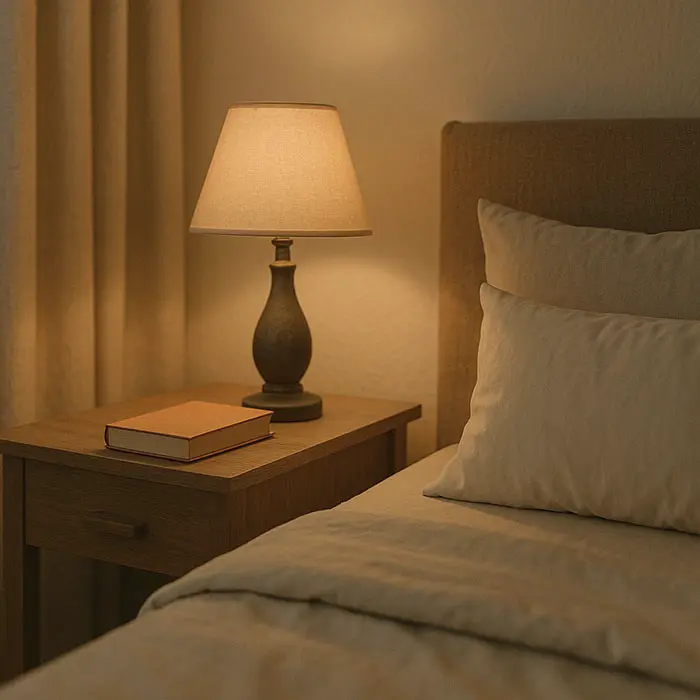
6. Do a Digital Declutter
Try a 30-day digital declutter, like Cal Newport suggests. Remove all non-essential apps from your phone, then slowly add back only what you really need. I did this last summer, and it was eye-opening. I realized I didn’t miss half the apps I thought I needed.
7. Replace Screen Time with Real Life
Fill the time you’d spend scrolling with stuff you love. Read a book, go for a walk, call a friend. I started taking evening walks in my neighborhood, noticing the way the sunset hits the trees. It’s way more refreshing than another hour on TikTok.
8. Start Small
You don’t have to go from 7 hours of screen time to zero overnight. Pick one thing to change, like turning off notifications for one app. I started with muting my group chats after 8 p.m., and it was a small step that made a big difference.
These tips aren’t about perfection they’re about progress. Start where you’re at, and you’ll be amazed at how much better you feel.
Your Real Questions (No Tech Shame Here)
- Q: Do I have to delete all my apps?
A: No. But maybe delete the ones that make you feel like garbage.
- Q: Is boredom good for me?
A: Honestly? Yeah. It lets your mind reset.
- Q: How do I stop doomscrolling at night?
A: Plug your phone in *outside* your bedroom. Game changer.
- Q: What if I miss something important?
A: You probably won’t. And if you do you’ll survive.
- Q: Can I do this with a busy job?
A: Yup. Boundaries make you more efficient, not less.
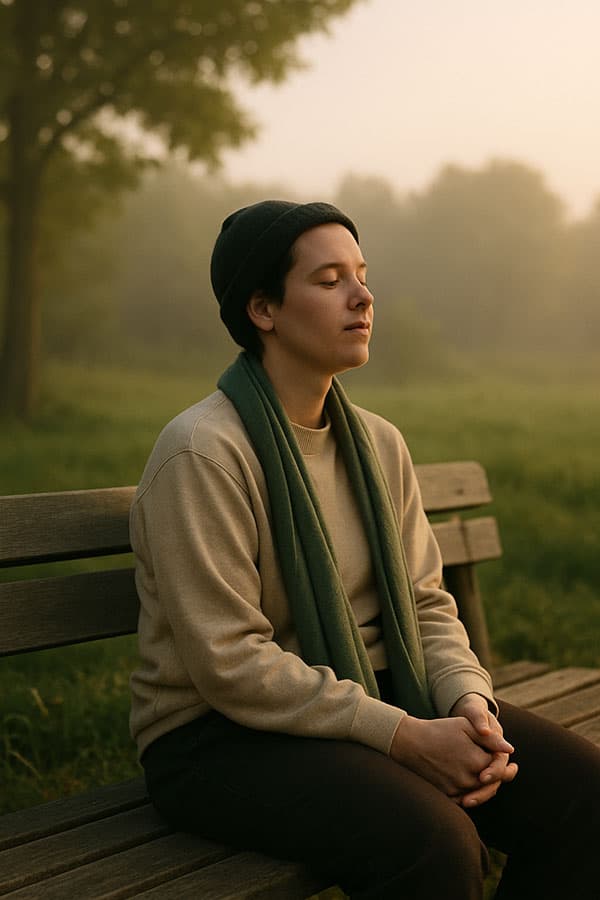
So… What Happens When You Actually Unplug?
I didn’t plan on it.
My phone just died one afternoon no charger in sight, no laptop either. And I sat there… twitchy fingers, brain racing, reaching for a phantom device that wasn’t there.
At first, it felt like withdrawal.
Then… this weird quiet. Then peace.
That’s when it hit me: maybe this screen thing is deeper than just “too much scrolling.”
Maybe it’s how we cope. And maybe we’re coping ourselves sick.
Overcoming the Hurdles
Digital minimalism sounds great, but it’s not always easy. Here are some common challenges and how to tackle them:
- FOMO (Fear of Missing Out): Worried you’ll miss something important? Most of what’s online is just noise. I used to stress about missing group chat drama, but now I check in once a day and still feel connected. Focus on quality over quantity.
- Work Demands: If your job needs you online, set boundaries. I told my boss I’d only check emails during work hours, and it’s been fine. You can still be professional without being on 24/7.
- Habit Loops: Checking your phone’s automatic, like brushing your teeth. Break the cycle by keeping your phone out of reach. I leave mine in another room when I’m working it’s a game-changer.
- Social Pressure: Friends might think you’re ghosting them if you’re less online. Explain what you’re doing. I told my crew I’m trying to cut back, and they totally got it.
I struggled with FOMO at first. I’d see my friends posting about parties or trips, and I’d feel left out. But then I realized I was happier spending time with them IRL than watching their stories. Less screen time, more real time

Can Less Screen Time Actually Improve Mental Health?
Short answer? Hell yes.
But not in the “just log off and go touch grass” kind of way.
Here’s the thing:
Screens aren’t evil. But the way we use them compulsively, constantly, reactively is burning out our nervous systems.
When I started reducing my screen time, I didnt just get fewer hedaches or more sleep.
I got back pieces of myself I didn’t even know were missing.
Like…
- Real attention span.
- The ability to be bored without spiraling.
- Actual mental clarity, not just noise.
Are We Happier With Less Screen Time?
It’s not magic.
It’s not like you delete TikTok and suddenly start frolicking in a meadow with deer.
But here’s what did happen for me:
- My anxiety attacks decreased.
- My sleep got deeper.
- I felt less envious, less reactive, more… here.
When I was online all the time, my brain was in a loop of:
compare → consume → check → scroll → feel bad → repeat.
Once that loop broke, I had room for other things like curiosity, rest, and quiet pleasure.
Also Read: Self-Care Isn’t Laziness Redefining Rest and Hustle
Digital Minimalism for the LGBTQ+ Community
For folks in the LGBTQ+ community, digital minimalism can be a lifeline. Social media’s a double-edged sword it’s a place to find community and support, but it can also expose you to hate, trolling, or just plain toxic vibes. Curating your online space to focus on positive, affirming content can make a huge difference.
A friend of mine who’s queer said they used to get sucked into online arguments about identity, and it left them drained. They started unfollowing negative accounts and joining online groups that celebrate diversity, like ones on Reddit or Discord. Now, their digital life feels like a safe space, not a battleground. If you’re part of the LGBTQ+ community, try seeking out affirming spaces and setting strict limits on platforms that stress you out. It’s like giving your brain a hug. 😊
The Science Behind It
This isn’t just feel-good talk there’s science to back it up. Here’s what the research says about digital minimalism and mental health:
- Stress Reduction: A 2019 study from the University of British Columbia found that cutting smartphone use led to better focus and lower stress levels.
- Mental Health: Reducing social media to 30 minutes a day can decrease loneliness and depression, according to a University of Pennsylvania study.
- Sleep Quality: Less screen time before bed improves sleep by reducing blue light exposure, which messes with your circadian rhythm.
- Productivity: Digital minimalism boosts focus by cutting distractions, letting you dive deeper into tasks.
Here’s a quick look at the data:
| Benefit | Impact | Source |
|---|---|---|
| Stress Reduction | Up to 40% decrease in stress levels | UCLA Health |
| Mental Health | Reduced loneliness and depression | University of Pennsylvania |
| Sleep Quality | Improved with less blue light exposure | Sleep Foundation |
| Productivity | Enhanced focus and task efficiency | Journal of Cognitive Enhancement |
Your brain’s not built for constant digital noise. Giving it a break is like letting it breathe again
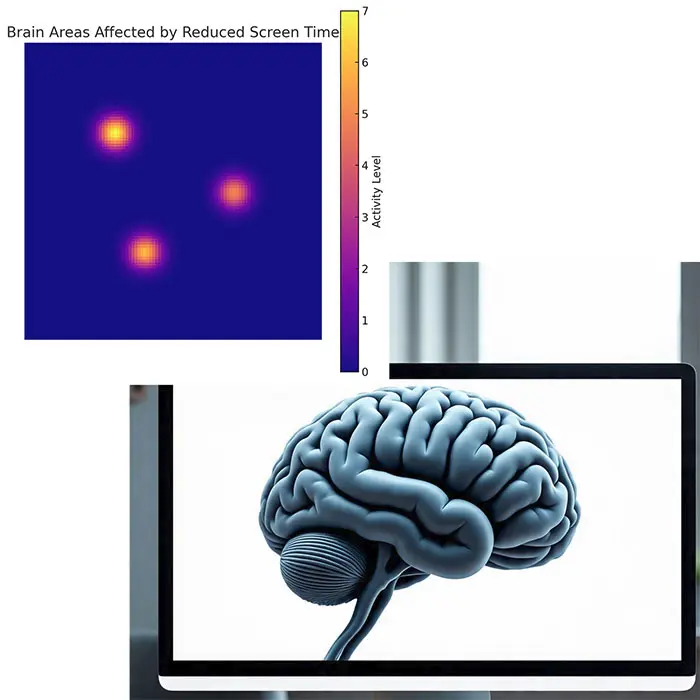
Does Less Screen Time = More Intelligence?
Interesting one. Let’s not go all “phones are making us dumb,” but…
Yes, studies do suggesst that cognitive function, memory, and problem-solving improve when we’re not constantly distracted.
It’s not that screens make you stupid.
It’s that constant distraction keeps your brain from ever entering deep work mode.
Or even just deep rest.
You lose the capacity to concentrate.
To wonder. To let thoughts connect.
So yeah less screen time doesn’t boost your IQ magically.
But it does make space for actual mental integration.
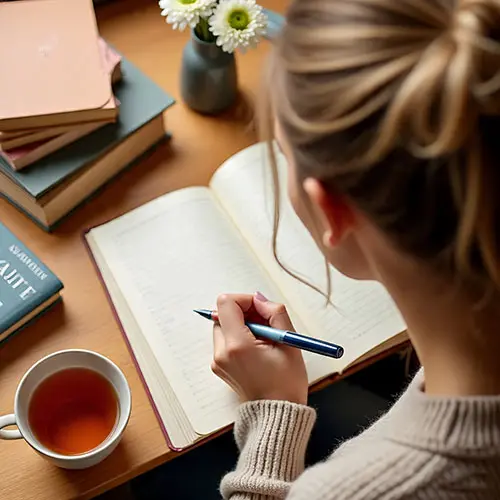
“Is 7 Hours of Screen Time Okay?”
It depends.
Is it 7 hours of editing videos for work, or 7 hours doom-scrolling Instagram while ignoring your life?
Not all screen time is equal.
But the bigger question is:
Are you using screens to engage with life or to escape it?
If you’re honest and the answer leans more toward numbing, then even 3 hours culd be too much.
For me, the tipping point wasn’t about hours. It was about intention.
I started asking:
- “Do I feel better or worse after this session?”
- “Did I choose this… or was I just pulled in?”
That alone changed everything.
“But What Will I Do Without My Phone?!”
This is the scariest part for most of us.
Because we don’t just overuse screens we build our whole lives around them.
At first, when I unplugged, I was bored out of my mind.
I’d wander from room to room like a lost Sims character.
But slowly, I began filling that void with life:
- Calling a friend instead of texting
- Actually tasting my food
- Taking walks without music
- Noticing the wind, the light, my breath
I wasn’t living less. I was living deeper.
🔷
Explore: 20 Real-Life Self-Care Struggles (and What Actually Helped)
Turning Off Your Phone = Mental Health Upgrade?
Pretty much, yeah.
Even a simple habit like putting your phone on airplane mode before bed can:
- Lower cortisol
- Improve sleep cycles
- Help your brain fully shut down and reset
What no one tells you is that your nervous system never gets to log off if your screen doesn’t.
Your phone’s blue light and pings trick your brain into staying alert even in the dark.
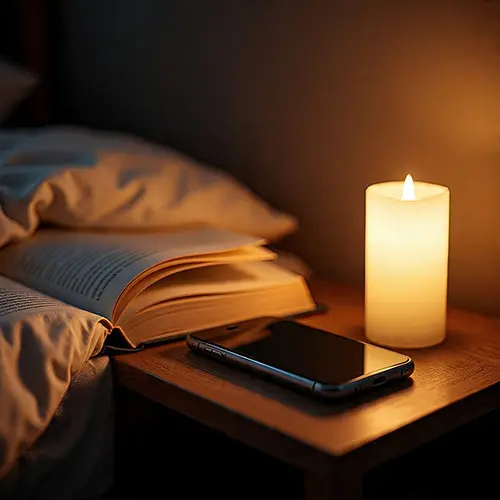
The Emotional Side of Screen Addiction
You don’t scroll for no reason.
You scroll because you’re:
- Lonely
- Anxious
- Overstimulated
- Avoiding something
And the more you scroll, the worse it gets.
It’s a trap.
We weren’t designed to consume this much, this fast.
Our brains evolved for presence, not constant pings and pixels.
So no your phone isn’t the enemy.
But the way it hijacks your emotions? That’s worth investigating.
More about: Psychology Today
What Helped Me Actually Cut Down?
Not gonna lie it wasn’t easy.
But these helped:
- Screen-free mornings: No phone until I’m out of bed, teeth brushed, and some kind of real-world moment happens.
- Grayscale screen: Less dopamine = less compulsion.
- Paper to-do lists instead of apps
- Using apps like Forest that lock me out during deep work
- Leaving the phone in another room while eating or reading
Most importantly, I stopped treating my phone like a limb.
It’s just a tool. Not my nervous system’s boss.
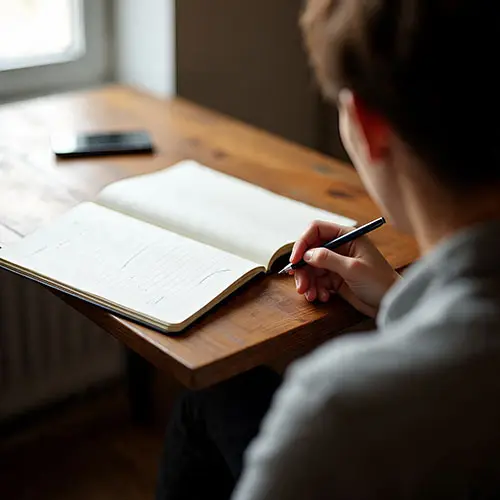
What If You Relapse?
You will. I did.
Several times.
This isn’t about perfection. It’s about awareness.
Every time you catch yourself binging again, that’s not failure.
That’s progress.
Because now, at least you notice.
You pause.
You breathe.
You choose again.
And that’s what healing is.
Final Thought: You’re Not Lazy You’re Overstimulated
Self-Care Isn’t Laziness: Redefining Rest and Hustle
Cutting screen time isn’t just a productivity hack.
It’s a form of sacred self-care.
Because when you stop filling every second with noise, you finally hear:
- Your own voice
- Your forgotten dreams
- Your real emotions
So yes, maybe it’s time to log off.
Not forever. Just enough to come back to yourself.
And trust me what you’ll find there is way more interesting than your feed.
Digital minimalism isn’t about hating tech or going bak to the Stone Age. It’s about taking control of your time, your attention, and your sanity. By cutting back on screens and being intentional with how you use tech, you can reduce stress, sleep better, and actually enjoy your life more.
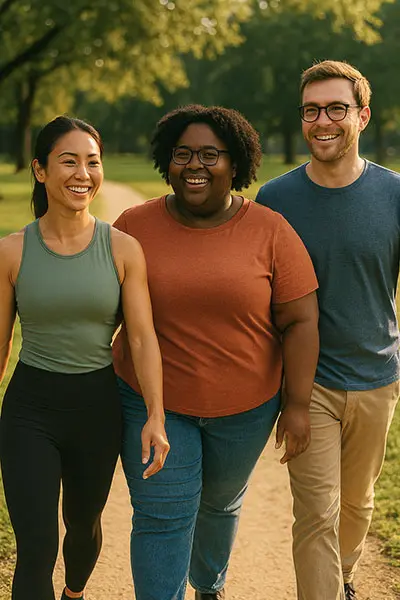
Start small. Turn off one notification. Take a walk without your phone. Unfollow that account that makes you feel like crap.
You don’t have to do it all at once just take one step. Your brain’ll thank you, and you might just find yourself feeling a little lighter, a little freer.
So, what’s it gonna be? Ready to unplug a bit and save your sanity? 😊
Citations:
- Cal Newport: Defines “Digital Minimalism” as intentionally clearing low-value tech noise
- UCLA Health: Highlights how digital tools can support mental health insights
- University of Pennsylvania: Shows social media use increases depression & loneliness
- Sleep Foundation: Explains blue light disrupts melatonin and sleep cycles
- Highly Sensitive Refuge: Discusses digital minimalism as a coping tool for HSPs
Related articles that I recommend you don’t miss :
Nope! It’s for anyone who wants to use tech in a way that helps, not hurts. It’s about being intentional, not anti-tech.
If you’re feeling distracted, stressed, or can’t put your phone down, check your screen time report. Numbers don’t lie!
Totally! Just use it on purpose follow accounts that lift you up and set time limits.
Set boundaries, like checking emails only during work hours. You can still be professional without being on 24/7.
✨ Last updated on 29.08.2025
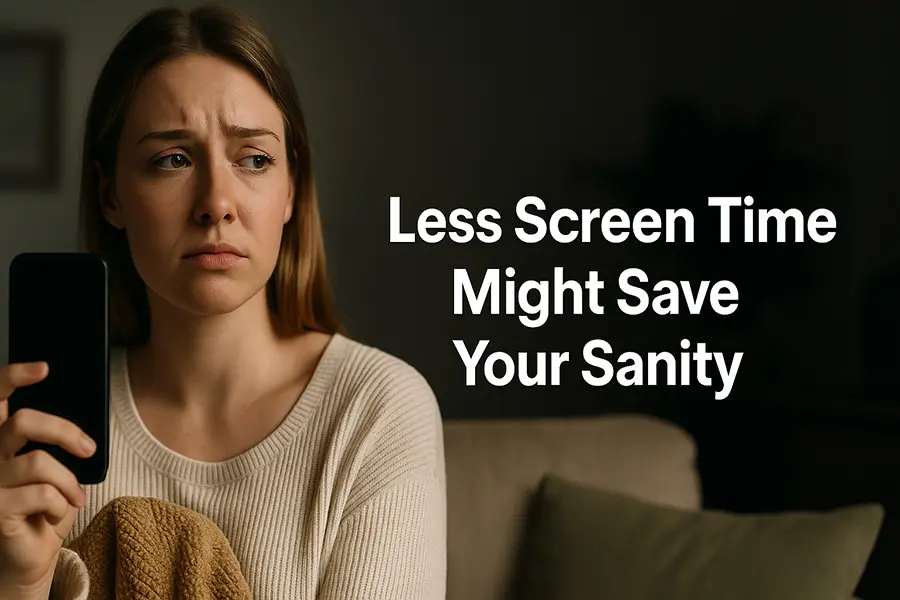




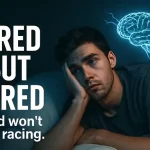





Leave a Reply